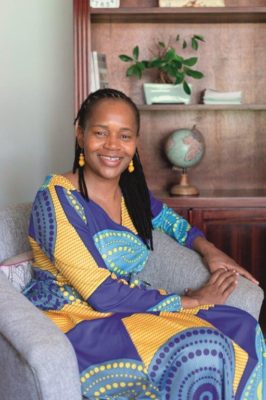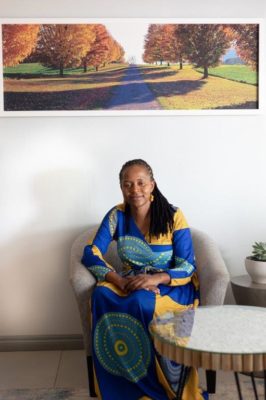Many people are hounded by the dark reality of depression. Specialist psychiatrist Tshilidzi Manyage of Mbombela talks about this debilitating illness and her passion for treating those who suffer from it.
 Tshilidzi grew up in Lwamondo, Venda as the eldest of five siblings. “My parents raised us to value education and to be independent individuals with strong moral values. My father sadly passed away seven years ago, but his teachings and wisdom inspire me to
Tshilidzi grew up in Lwamondo, Venda as the eldest of five siblings. “My parents raised us to value education and to be independent individuals with strong moral values. My father sadly passed away seven years ago, but his teachings and wisdom inspire me to
this day.”
As it goes in Africa, she was not only raised by loving parents, but also, true to tradition, by the whole village. They taught her to have humility and respect for her elders.
After finishing matric, she first obtained a BSc degree at the University of Venda and then a degree in medicine at the University of KwaZulu-Natal. She later specialised in psychiatry at Sefako Makgatho Health Sciences University, better known as Medunsa.
Tshilidzi developed a passion for people suffering from mental health issues while doing her internship and community service at Themba Hospital. She also saw the debilitating impact of mental illness on family dynamics in the village she grew up in, and realised that she could provide much-needed care by specialising in psychiatry.
 Depression is a stark reality and Tshilidzi deals with it on a daily basis. One of the contributing factors is denial. “It is wise to remember that a human being consists of a mind, a soul, and a physical body. People are more inclined to seek help for illnesses of the body while the soul always gets left behind and mental illness is unattended.”
Depression is a stark reality and Tshilidzi deals with it on a daily basis. One of the contributing factors is denial. “It is wise to remember that a human being consists of a mind, a soul, and a physical body. People are more inclined to seek help for illnesses of the body while the soul always gets left behind and mental illness is unattended.”
The only way to remedy this is for people to realise that depression is an illness. Sylvia Plath accurately describes this concept in The Bell Jar: “I wanted to tell her that if only something were wrong with my body it would be fine, I would rather have anything wrong with my body than something wrong with my head, but the idea seemed so involved and wearisome that I didn’t say anything.”
South Africa has seen a rise in the frequency of depression and anxiety over the past few years and according to the South African College of Applied Psychology, as many as one in six people suffers from it.
The illness affects people of all racial groups and socioeconomic backgrounds. “The current dire state of the South African economy is impacting heavily on mental well-being. Most people are facing unemployment, and managing a household has become extremely difficult.
“Unfortunately, economic suffering leads to other problems, for instance domestic violence, crime, divorce, child abuse, and chronic disease. These factors slowly affect our mental well-being, which over time leads to depression and anxiety.”
Notwithstanding the huge prevalence and the fact that education has come a long way in debunking the myths, many South Africans still suffer in silence. Stigma is seen as the main culprit.
 “We do not want people to know about our struggles and weaknesses,” Tshilidzi explains. Education should focus on replacing the stigma and preconceived ideas by having understanding and empathy. All people should work towards accepting and confronting mental health issues and help the helpless without passing judgment.
“We do not want people to know about our struggles and weaknesses,” Tshilidzi explains. Education should focus on replacing the stigma and preconceived ideas by having understanding and empathy. All people should work towards accepting and confronting mental health issues and help the helpless without passing judgment.
The fact that people are slowly becoming more and more aware of the devastating impact of depression and anxiety is, however, hopeful.
On the question of how Tshilidzi preserves her own mental well-being, she answers, “I try to spend as much time as possible with my husband and two boys. I also love reading and have recently taken up gardening.” She finds it important to be on her own, and simply appreciates life as it is.
Details
Tshilidzi’s consulting rooms can be contacted on 013-741-1711
Text: LIEZEL LÜNEBURG. Photographer: TANYA ERASMUS.


